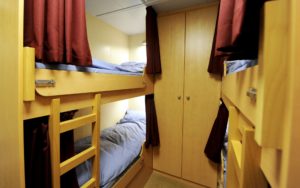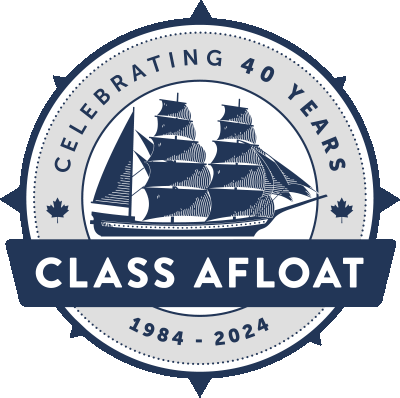Please do not hesitate to contact us if you do not find answers to your questions!
Academics FAQs
Successful applicants have a strong academic profile and involvement in their school and community. Our crew is made up of students from around the world! On average, our crew is 60% Canadian and 40% international, with students representing up to 14 nationalities. Students are generally between the ages of 16-19 and are enrolled in the final two years of secondary school (Canadian grade 11, 12), the first year of university or have chosen to take a gap year after high school.
- Yes. Students follow a Canadian (province of Nova Scotia) high school curriculum.
- Class Afloat is fully accredited by the Ministry of Education in Nova Scotia, Canada. Credits can be transferred back to the student’s home high school.
- Students who complete the Grade 12 year will be issued an internationally recognized Nova Scotia High School Graduation Diploma.
- Yes. Our experience is that high school credits from Nova Scotia, Canada have been successfully transferred to high schools worldwide. Each student must check with their guidance counsellor to ensure proper credit transfer.
- Yes. Students who meet entrance requirements can earn university credits through Acadia University in Nova Scotia, one of Canada’s top-ranked undergraduate institutions.
- Upon completion of the program, these credits may be transferred to a degree program at a university of the student’s choice.
- Yes. Gap Year students take at least two courses (either high school or university level).
- Each year we have students from many countries who speak many languages.
- All students must be able to converse in English and have a sufficient english language capability that allows them to successfully complete courses with instruction in English only.
- All courses are offered in English, providing an immersion in the language.
- ESL classes are offered for those looking for extra assistance.
- The academic year is divided into two semesters (September – January and January – May).
- Students may attend a full academic year or one semester. Some students choose to attend multiple years.
- Our class will start their journey with a land based program in European destinations then board the ALEX-2 for their sea voyage. The 2022-23 program will finish with a land based program in European locations where our community will continue classes, explore the local area and spend some time reflecting on their amazing community journey on land and at sea.
- Our high school courses are outlined here. Our university curriculum is outlined here.
- In collaboration with their guidance counsellor, students submit their course selection preferences to Class Afloat.
- High school students take 3-5 courses per semester.
- University students take 2-4 courses per semester.
- Depending on course selection, students will complete up to 5 hours of class work each day.
| University | Field of Study | State/Province | Country |
| Acadia | Biology | Nova Scotia | Canada |
| Bishops | Information Technology | Quebec | Canada |
| Carleton University | Cognitive Psychology | Ontario | Canada |
| Concordia University | Liberal Arts, Psychology | Quebec | Canada |
| Dalhousie | Commerce, Science | Nova Scotia | Canada |
| Laurier | Health Sciences, Communications | Ontario | Canada |
| MacEwan University | Nursing | Alberta | Canada |
| McGill | Humanities, Life Science, Mechanical Engineering | Quebec | Canada |
| Mount Allison | Science and Aviation | New Brunswick | Canada |
| NYU | Film and Television | New York | USA |
| Queens | Chemistry & Bioengineering | Ontario | Canada |
| Santa Clara University | Management Information Systems | California | USA |
| Sarah Lawrence College | New York | USA | |
| Sherbrooke University | Mechanical Engineering | Quebec | Canada |
| UBC | General Science and Masters of Management | British Columbia | Canada |
| University of Hamburg | Psychology/Dentistry | Hamburg | Germany |
| Western (Ivey School of Business) | Economics | Ontario | Canada |
Ports of Call FAQs
- Our port stays vary depending on location, but, on average, the ship stops in each port for 5 days, including arrival and departure days.
- Port program activities are scheduled for the students. These activities can include community service projects, museum tours, cultural events, hiking trips, homestays, camping trips, surfing, snorkeling, etc.
- All school-planned port program activities are included in our program fees.
- Students also have time to enjoy shore leave (free-time) in each port, travelling in groups of four.
Safety is of paramount concern for Class Afloat. Read more about Health and Safety at sea and in port.
- Please refer to the Itinerary for the planned locations and dates of our 5 land locations and 14 port visits. In each academic year, we usually visit about 20 land and/or port locations.
- The 2025-2026 school year will start on land at a nature camp north of Berlin, Germany, and travel to The Netherlands, outside Amsterdam before moving on to Bremerhaven, Germany, where we will board the ALEX-2. The last 5 weeks of the school year took place at land locations in Switzerland, France and Spain. Classes are held on a regular schedule and students will have the opportunity to explore the surrounding area.
- In the past our voyage itinerary takes us to 20 ports on up to 3-4 continents.
- The program will usually start at the ALEX-2 home port, Bremerhaven, Germany and this year we will sail into the Atlantic or Mediterranean before visiting Morocco on the African coast and the island of Cabo Verde. From there the ship will do its first transatlantic crossing to South America and the Caribbean
- We will explore Caribbean islands and visit Samana, DR, for our a homestay and community service project, before sailing on to Bermuda and embarking on our second Atlantic crossing to ports Europe.
- Our itineraries are announced each year for the following academic year.
- They can be found on our website here.
- Itineraries are developed based on sailing conditions, climate, safety, political stability, and academic suitability. Class Afloat reserves the right to change or modify ports of call.
The Sailing FAQs
- Not at all!
- We will teach you everything you need to know to be a tall ship crew member.
- For even the most experienced keel boat sailer, learning to sail a tall ship is a whole new experience. All students learn to sail their ship together regardless of their sailing experience.
- Students perform 2 hours of day watch and 2 hours of night watch each day.
- The watch group is responsible for operating the ship, under the direction of the professional mariner crew.
- Duties can include navigation, taking the helm (the steering wheel), hoisting sails from the hundreds of lines running down to the deck, climbing the rigging to drop or stow sails, working in the galley, performing maintenance work or standing watch.
- Students are not required to climb the rigging. Those interested in doing so must complete a physical fitness test before climbing.
Accommodations FAQs
- Students will share a 4 bunk cabin.
- Each cabin has its own head (toilet) sink and shower.
- Students will have storage closets to store their gear.
- Cabins are designated as male or female.
- Each student cabin has its own Heads (washroom), including a toilet, sink and shower.
- All head facilities are modern.

- A schematic diagram and images of the ship are featured here.
Meals FAQs
Sample menu
Breakfast: Freshly chopped fruit bowl, oats with milk, sugar, raisins and nuts, along with a rotating hot dish like eggs and bacon, French toast or pancakes
Lunch: Sandwich, salad and hot entree
Dinner: Deliciously seasoned meats, vegetables, pasta and grains, dessert
*Meals are prepared fresh by our cooks and students in the a modern, state-of-the-art galley. Breakfast, lunch, dinner and snacks are served daily.
- Yes, we are able to cater to most dietary needs. Vegetarian meals are easily accommodated.
- Students with special dietary needs should advise Class Afloat at the time of application to ensure that these needs can be met.
Crew & Staff FAQs
- A Shipboard Director leads a team of 6 dedicated academic faculty.
- The ship sails with a certified crew of 22 professional mariners, including:
- Captain
- 3 Navigational Officers: 12, 2nd, 3rd Mate
- 3 Watch Leads
- 1 Bosun
- 3 Engineers
- 3 ABs
- 6 Ordinary Seamen O/S
- Medical Officer
- 3 Cooks
- More information about our staff and crew can be found here.
Health & Safety FAQs
- A fully certified physician (Ship Doctor) is on duty in the ship hospital at all times to provide care in cases of sickness or injury.
- The ship hospital stocks a supply of medications and medical supplies that are available to the Ship Doctor.
- In the case of a serious medical emergency, the ship will sail to the nearest port or, if a more urgent need for hospital care is required, perform a medical evacuation airlift procedure.
- Seasickness happens when the body, inner ear, and eyes all send different signals to the brain, resulting in queasiness.
- Seasickness can appear in the first week at sea and usually disappears without medical treatment within a few days, as your brain learns to compensate for the movement of the boat and you get your “sea legs”
- Safety is paramount in all aspects of the Class Afloat program, however, there is risk involved in sailing as there are in all types of adventure and sport activities.
- A structured process of training is conducted to educate students about all safety matters and procedures aboard the ship.
- Our ship based management team, faculty, medical officer and professional mariner crew ensure that safety is the first and foremost concern for everyone aboard the ship.
Application Process FAQs
- Detailed information about the application process are here.
More Information FAQs
- Explore our website for information about the application process, our curriculum and program details, as well as videos, pictures and a brochure.
- Please do not hesitate to contact the Class Afloat office – we would be happy to answer your questions.
- If you are interested in talking to an alumni or alumni family member, please contact us and we will connect you.
- You may also connect with us on Facebook, Twitter, and Instagram


